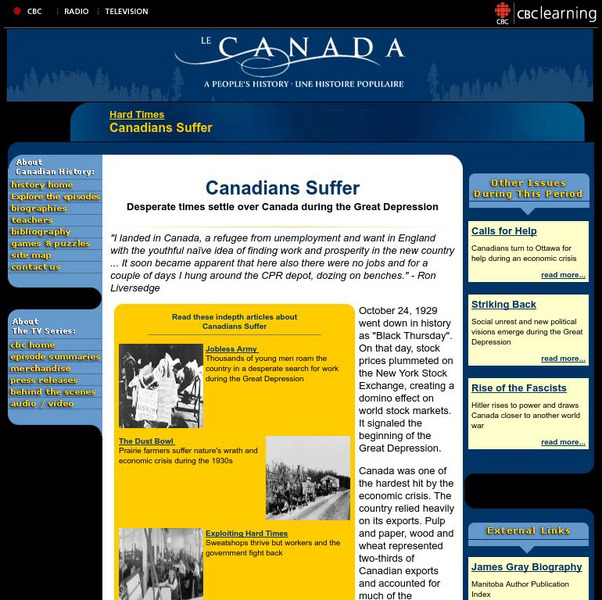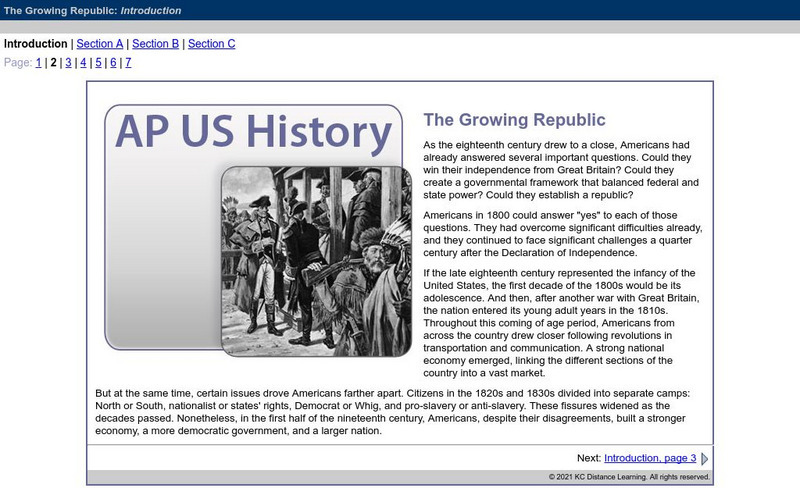Council for Economic Education
Econ Ed Link: The Choice Is Us: Monopolies
This lesson plan introduces the concept of monopoly. It calls upon middle schoolers to consider how monopoly power might affect the quality and price of goods and services offered to consumers. In light of what they learn about the...
Council for Economic Education
Econ Ed Link: Widget Production: Producing More Using Less
Through this economics lesson you will learn about widget production. One of the tasks is to see how productivity can help solve problems.
Practical Money Skills
Practical Money Skills: Recession
Learn about recessions, periods of economic slowdown often marked by high rates of unemployment, plunging stock prices, lower corporate profitability, and consumer anxiety.
George Mason University
Problems With Markets: Week 12: Problems With Regulation
This resource outlines different economic and political options, and focuses on the problems associated with government ownership and socialism. Good background for a paper.
Other
South Western Learning: Econ News: Externalities, Market Failure, Public Choice
This study guide distinguishes between positive and negative externalities and how to correct negative externalities. Some learning exercises and an online quiz are also provided.
Council for Economic Education
Econ Ed Link: Don't Fence Me Out! (Barriers to Trade)
We tend to see the United States as a country with free trade. Although we do have a great deal of freedom to enter new markets, there are barriers to trade that limit consumer choice. This lesson explores these barriers and how they work.
The Federal Reserve System
Federal Reserve Board: Beige Book
This page provides access to the Beige Book, published eight times per year. Each Federal Reserve Bank gathers anecdotal information on current economic conditions in its district through reports from bank and branch directors, and...
Council for Economic Education
Econ Ed Link: What Causes Inflation?
This lesson explores different types of inflation and terms associated with this economic concept. You may have heard relatives talk about the good old days when a dollar would buy something. What happened to that dollar? Why won't it...
Council for Economic Education
Econ Ed Link: Why Do We Need Money? Think About Ebay!
The learners investigate money--its purpose and functions. They complete an exercise, using the online auction site eBay, to learn why money is critical to an economy.
Khan Academy
Khan Academy: Changes in Equilibrium
Practice finding a new equilibrium price and quantity when supply changes, demand changes, or both supply and demand are changing simultaneously.`This resource is designed as a review for the AP Microeconomics Test or a college-level...
Tom Richey
Tom Richey: Ayn Rand's Anthem
Learning unit and essay writing contest based on Ayn Rand's dystopian novella, Anthem. Includes student reading guides, essay guidelines and contest link.
McGraw Hill
Mc Graw Hill: Higher Ed: The Free Enterprise System
Overview of the Free Enterprise system in the United States discusses how production, prices, and goods and services are determined.
Library of Congress
Loc: Perestroika
In these revelations from Russian archives, perestroika is explained. Mikhail Gorbachev's program of economic, political, and social restructuring, became the unintended catalyst for dismantling the totalitarian state. Also contains...
PBS
Pbs Online News Hour Extra: u.s. Economy Officially in a Recession
The verdict is in and the U.S. is in a recession. Find a succinct explanation of the 2008 recession and backtrack to the Great Depression. Follow up with discussion questions and a lesson plan complete with a glossary of terms. December...
National Humanities Center
National Humanities Center: America in Class: America in the 1920s: Prosperity: Crash
The National Humanities Center presents collections of primary resources compatible with the Common Core State Standards - historical documents, literary texts, and works of art - thematically organized with notes and discussion...
Other
Reuters: Ben Bernanke's Speech on the Financial Crisis
A solid "state of the economic crisis" speech by Bernanke that outlines the reasons for the crisis as well as possible U.S. policy responses. 1/13/09
Curated OER
Cbc.ca: Hard Times Canadians Suffer
During the Great Depression, Canada was one of the very hardest hit countries.An overview is given of the fall of the stock market, unemployment, economic crisis, Dust Bowl years.
University of Michigan
University of Michigan: A Monetary Explanation of the Great Stagflation [Pdf]
A comprehensive look at the economic condition of the 1970s termed stagflation. Authors take a different view noting that oil price increases were not as essential to stagflation as thought. They develop the relationship between monetary...
Department of Defense
Do Dea: Ap Us History: Unit 3: The Growing Republic
This extensive learning module examines how the United States' efforts to increase foreign trade, add new territory, and isolate itself from Europe affected its foreign policy and other initiatives. It investigates how advances in...
Digital History
Digital History: Transforming American Law
Changes in American law promoted economic growth. See how private companies were protected from penalties and liabilities, and were given special privileges because they contributed to the public good.
Other
Latin Focus: Brazil News Archive
This site provides links to Brazilian economic indicators as well as an archive which you can search for news articles about economic stories by date or country.
Other
South Western Learning: Econ News: Price Ceilings and Price Floors
Offers a summary of when government intervention and market-determined prices are necessary to stabilize the economy. Includes an interactive quiz at the end.
Khan Academy
Khan Academy: How Well Gdp Measures the Well Being of Society
Does GDP capture everything we care about in an economy?.
Wisc-Online
Wisc Online: European Union
This is an animated resource that lists countries that have joined the European Union. Includes dates and maps of the countries.

















